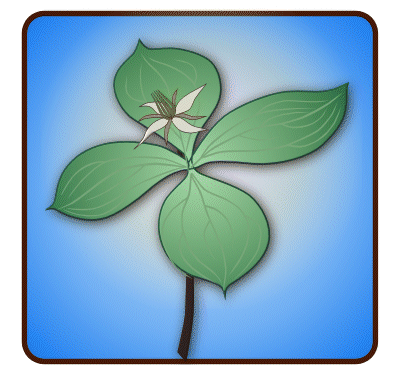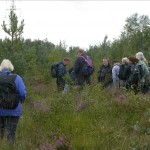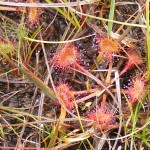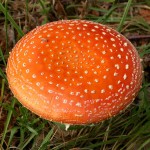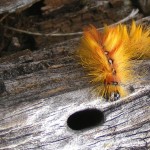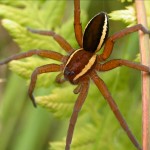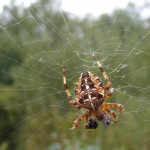Michael Keith-Lucas led a walk at Wildmoor Heath on Sunday 19th September, starting at BBOWT’s Broadmoor Bottom Reserve. Pollen analysis shows that the peat deposits in the valley bottoms have been accumulating since the last ice age. After a perilous crossing of a valley mire, using large tussocks and trying to avoid the intervening deep boggy sections, plants found included Round-leaved Sundew, the orange seed heads of Bog Asphodel, White Beak-sedge and a number of different types of sphagnum moss. A large spider with 4 white dots on its back was identified as Araneus quadratus.
Walking up the side of the valley, the path crossed the Bagshot Sands and climbed up to the gravel deposits at the top of the hill. Cross-leaved Heath Erica tetralix was restricted to wet areas in the valley bottom, Bell Heather Erica cinerea was only found in the drier areas at the top, while Heather Calluna vulgaris was found throughout. Bracken was restricted to the Bagshot Sands and its upper limit marked the boundary with the gravel deposits.
Michael likened himself to the Grand Old Duke of York as he led the group back down the hillside and across the wet valley bottom again, where a Raft Spider was seen on the fronds of a Hard Shield-fern. Following recent rain, a wide variety of fungi was found, including a Blusher, a Brown Birch Boletus and a spectacular display of Fly Agaric. The caterpillar of a Sycamore Moth crawled across a fallen pine trunk and then disappeared inside a hole in the wood. To the relief of those photogaphers who had failed to record it before it vanished, it re-emerged for further pictures. It had long orange and yellow hairs and white spots.
Pictures by Rob Stallard and Jan Haseler
| RDNHS trip to Wildmoor Heath 19 Sept 2010 | |
| Leader: Michael Keith-Lucas | |
| Angiosperm Plants and Ferns | |
| Latin name | English name |
| Agrostis capillaris | Common Bent |
| Aira praecox | Dune Hair-grass |
| Betula pendula | Silver Birch |
| Betula pubescens | Downy Birch |
| Calluna vulgaris | Heather |
| Carex panicea | Carnation Sedge |
| Carex viridula | Yellow-sedge |
| Cirsium palustre | Marsh Thistle |
| Cytisus scoparius | Broom |
| Deschampsia flexuosa | Wavy Hair-grass |
| Drosera rotundifolia | Round-leaved Sundew |
| Dryopteris dilatata | Broad Buckler-fern |
| Dryopteris filix-mas | Male-fern |
| Erica cinerea | Bell Heather |
| Erica tetralix | Cross-leaved Heath |
| Holcus lanatus | Yorkshire-fog |
| Holcus mollis | Creeping Soft-grass |
| Juncus conglomeratus | Compact Rush |
| Juncus effusus | Soft-rush |
| Juncus squarrosus | Heath Rush |
| Juncus tenuis | Slender Rush |
| Lathyrus pratensis | Meadow Vetchling |
| Lotus pedunculatus | Greater Bird’s-foot-trefoil |
| Molinia caerulea | Purple Moor-grass |
| Narthecium ossifragum | Bog Asphodel |
| Pinus sylvestris | Scots Pine |
| Plantago major | Greater Plantain |
| Polygonum hydropiper | Water-pepper |
| Polygonum persicaria | Redshank |
| Polystichum aculeatum | Hard Shield-fern |
| Populus tremula | Aspen |
| Potamogeton polygonifolius | Bog Pondweed |
| Potentilla erecta | Tormentil |
| Pteridium aquilinum | Bracken |
| Quercus cerris | Turkey Oak |
| Quercus robur | Pedunculate Oak |
| Ranunculus flammula | Lesser Spearwort |
| Rhynchospora alba | White Beak-sedge |
| Senecio jacobaea | Common Ragwort |
| Ulex minor | Dwarf Gorse |
| Vaccinium myrtillus | Bilberry |
| Vicia cracca | Tufted Vetch |
| Vicia hirsuta | Hairy Tare |
| Mosses and Liverworts | |
| Hypnum jutlandicum | |
| Polytrichum commune | |
| Polytrichum formosum | |
| Sphagnum magellanicum | |
| Sphagnum palustre | |
| Sphagnum papillosum | |
| Lichens | |
| Cladonia fimbriata | |
| Fungi | |
| Amanita muscaria | Fly Agaric |
| Amanita rubescens | The Blusher |
| Lactarius rufus | Rufous Milk-cap |
| Spiders | |
| Araneus quadratus | |
| Araneus diadematus | |
| Dolomedes fimbriatus | Raft Spider |
| Insects | |
| Acronicta aceris | Sycamore moth caterpillar |
List prepared by Renee Grayer
